In probability theory and related fields, Malliavin calculus is a set of mathematical techniques and ideas that extend the mathematical field of calculus of variations from deterministic functions to stochastic processes. In particular, it allows the computation of derivatives of random variables. Malliavin calculus is also called the stochastic calculus of variations. P. Malliavin first initiated the calculus on infinite dimensional space. Then, the significant contributors such as S. Kusuoka, D. Stroock, J-M. Bismut, S. Watanabe, I. Shigekawa, and so on finally completed the foundations.
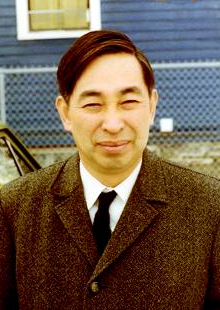
Kiyosi Itô was a Japanese mathematician who made fundamental contributions to probability theory, in particular, the theory of stochastic processes. He invented the concept of stochastic integral and stochastic differential equation, and is known as the founder of so-called Itô calculus.

Albert Nikolayevich Shiryaev is a Soviet and Russian mathematician. He is known for his work in probability theory, statistics and financial mathematics.
In mathematics, the Clark–Ocone theorem is a theorem of stochastic analysis. It expresses the value of some function F defined on the classical Wiener space of continuous paths starting at the origin as the sum of its mean value and an Itô integral with respect to that path. It is named after the contributions of mathematicians J.M.C. Clark (1970), Daniel Ocone (1984) and U.G. Haussmann (1978).
Daniel Wyler Stroock is an American mathematician, a probabilist. He is regarded and revered as one of the fundamental contributors to Malliavin calculus with Shigeo Kusuoka and the theory of diffusion processes with S. R. Srinivasa Varadhan with an orientation towards the refinement and further development of Itô’s stochastic calculus.

Paul Malliavin was a French mathematician who made important contributions to harmonic analysis and stochastic analysis. He is known for the Malliavin calculus, an infinite dimensional calculus for functionals on the Wiener space and his probabilistic proof of Hörmander's theorem. He was Professor at the Pierre and Marie Curie University and a member of the French Academy of Sciences from 1979 to 2010.

Kalyanapuram Rangachari Parthasarathy is professor emeritus at the Indian Statistical Institute and a pioneer of quantum stochastic calculus.
Jean-Michel Bismut is a French mathematician who has been a professor at the Université Paris-Sud since 1981. His mathematical career covers two apparently different branches of mathematics: probability theory and differential geometry. Ideas from probability play an important role in his works on geometry.
Moshe Zakai was a Distinguished Professor at the Technion, Israel in electrical engineering, member of the Israel Academy of Sciences and Humanities and Rothschild Prize winner.

James Ritchie Norris is a mathematician working in probability theory and stochastic analysis. He is the Professor of Stochastic Analysis in the Statistical Laboratory, University of Cambridge.
Sir Martin Hairer is an Austrian-British mathematician working in the field of stochastic analysis, in particular stochastic partial differential equations. He is Professor of Mathematics at EPFL and at Imperial College London. He previously held appointments at the University of Warwick and the Courant Institute of New York University. In 2014 he was awarded the Fields Medal, one of the highest honours a mathematician can achieve. In 2020 he won the 2021 Breakthrough Prize in Mathematics.

Kalyan Bidhan Sinha is an Indian mathematician. He is a professor at the Jawaharlal Nehru Centre for Advanced Scientific Research, and Professor Emeritus for life of the Indian Statistical Institute.

Fernando Codá dos Santos Cavalcanti Marques is a Brazilian mathematician working mainly in geometry, topology, partial differential equations and Morse theory. He is a professor at Princeton University. In 2012, together with André Neves, he proved the Willmore conjecture.
Marta Sanz-Solé is a Catalan mathematician specializing in probability theory. She obtained her PhD in 1978 from the University of Barcelona under the supervision of David Nualart.
Rachel Ann Kuske is an American-Canadian applied mathematician and Professor and Chair of Mathematics at the Georgia Institute of Technology.
Steven Joel Miller is a mathematician who specializes in analytic number theory and has also worked in applied fields such as sabermetrics and linear programming. He is a co-author, with Ramin Takloo-Bighash, of An Invitation to Modern Number Theory, with Midge Cozzens of The Mathematics of Encryption: An Elementary Introduction, and with Stephan Ramon Garcia of ``100 Years of Math Milestones: The Pi Mu Epsilon Centennial Collection. He also edited Theory and Applications of Benford's Law and wrote The Mathematics of Optimization: How to do things faster and ``The Probability Lifesaver: All the Tools You Need to Understand Chance. He has written over 100 papers in topics including accounting, Benford's law, computer science, economics, marketing, mathematics, physics, probability, sabermetrics, and statistics, available on the arXiv and his homepage.
Shinzō Watanabe is a Japanese mathematician, who has made fundamental contributions to probability theory, stochastic processes and stochastic differential equations. He is regarded and revered as one of the fundamental contributors to the modern probability theory and Stochastic calculus. The pioneering book “Stochastic Differential Equations and Diffusion Processes” he wrote with Nobuyuki Ikeda has attracted a lot of researchers into the area and is known as the “Ikeda-Watanabe” for researchers in the field of stochastic analysis. He had been served as the editor of Springer Mathematics.

Thomas G. Kurtz is an American emeritus professor of Mathematics and Statistics at University of Wisconsin-Madison known for his research contributions to many areas of probability theory and stochastic processes. In particular, Kurtz’s research focuses on convergence, approximation and representation of several important classes of Markov processes. His findings appear in scientific disciplines such as systems biology, population genetics, telecommunications networks and mathematical finance.
Rama Cont is the Professor of Mathematical Finance at the University of Oxford. He is known for contributions to probability theory, stochastic analysis and mathematical modelling in finance, in particular mathematical models of systemic risk. He was awarded the Louis Bachelier Prize by the French Academy of Sciences in 2010.

Leonard Gross is an American mathematician and Professor Emeritus of Mathematics at Cornell University.












